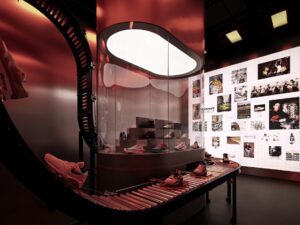“To withstand an idea, we must survive to tell it.”
A Visit to Hannah Arendt and the 20th Century
Hannah Arendt (b. 1906, outside Frankfurt) wrote on totalitarian rule, antisemitism, the situation of refugees, Zionism, the Eichmann trial, racial segregation in the US, the student protests of the 60s, and feminism. 100 years later, none of the topics addressed by her over the course of her life have been closed.
The current exhibit at the Deutsches Historisches Museum is an exhaustive retrospect of Arendt’s earlier life and relationships, her political activism and philosophical work, and includes personal belongings and photographs, which conclude the show. I arrived thinking two hours would be enough time to satisfy my curiosity, but I easily could have spent two more hours listening to all of the dispersed interviews and diving deeper into her texts. The exhibit sprawls across both main floors of the museum.
The time in which she lived is prime fodder for reflection on present-day matters at hand. The places in which she lived during such foundational shaking times mirror a palpable energy that is felt by today’s generation in those very same places dealing with very similar societal issues: nationalism in Germany, classism in France, racism in America.
After ardently speaking out against the Nazi regime (during this time she wrote The Origins of Totalitarianism), she fled from Germany to New York City, setting herself up as a prominent academic and journalist. Writing for the New Yorker, she was assigned coverage of the seminal Eichmann Trial.
While some of the topics are extremely uncomfortable, the exhibit is also a reminder that there is a hope to be cherished. We have come such a long way from the time in which a “banality of evil” was dubbed, yet we as a society have much work still to do, with the majority of that work being in the form of maintenance. Our values must be tended, lest we fade into disenchantment. We must converse with each other and hold each other accountable, as shown in a large area dedicated to Arendt’s friendships. We must hold strong to our personal morals if we wish to see them reflected as a whole in the world we live in, and we must be vocal (if not LOUD) when we see corruption gaining foothold. If your enthusiasm for political discourse is waning and your energy level regarding activism is fading, look to Arendt for inspiration.
Text by Janna Shaw
Images courtesy of the Deutsches Historisches Museum



